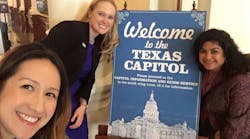The advocacy race is a slow and steady one. It is a race that requires determination and preparation to reach the finish line. One would not start a marathon without training; the same should be true for legislation and advocacy. I often hear hygienists in my home state of Texas complaining that we have yet to be able to administer local anesthesia. While this is frustrating, the lack of advocacy on the part of my colleagues is equally as disappointing.
Nonetheless, for some, it is not the lack of desire but the lack of know-how that impedes them from assisting in legislative efforts. I started participating in legislative efforts only a couple of years out of dental hygiene school, with zero experience or understanding of the legislative process. Today, I write this article not as an expert but simply as a hygienist who wants to have an impact.
What you need to know
First, you need to have a basic understanding of how something becomes law. To put it simply, the key to passing legislation is building relationships. Dental hygienists who want to advocate for or against specific legislation need to develop relationships with legislators, coalitions, and other dental organizations. Relationship-building with legislators is essential, because a bill needs the support of legislators to become law. A law first starts as a bill. That bill needs to be voted on in the Senate by senators and in the House by state representatives. If it is voted on and passed in both the House and the Senate, it goes to the governor’s desk to sign into law. While this may sound like a simple process, there are many steps a bill must go through before it is called for a vote. These steps—for example, being heard in committee—require legislators’ support. To gain legislators’ (senators’ and representatives’) support, one must build relationships.
How to build relationships
Large organizations build relationships with legislators by donating to their campaigns or initiatives. While financial donations can be influential, our strength lies in donating our time. There are several ways to do this, but the first thing to remember is to show up. If legislators see that you supported them in their campaign efforts, they are more likely to listen to you and your interests when the time comes.
As community members, we can volunteer to block-walk, work phone banks, and organize outreach events. Block-walking is what it sounds like—community members walking through neighborhoods and campaigning door-to-door. While this may sound intimidating, especially for those of us who like to avoid conflict or controversy, it is not bad at all. I have block-walked multiple times and never had a bad experience. This is likely because there is a science to block-walking. You do not simply knock on everyone’s door. Instead, you receive a list of homes in an area registered to that legislator’s political party. This list reduces the chances of you knocking on someone’s door who has completely opposing views than the legislator.
If talking to someone face-to-face does not sound appealing, you might be more comfortable volunteering for a phone bank. Phone banks offer flexibility. I’ve volunteered at phone banks to make phone calls to community members at my leisure, and I’ve organized phone banking events. Volunteering for a scheduled phone bank event holds value because you are likely to have an opportunity to meet your legislator and hopefully start to build a relationship.
While I have done block-walking and phone banking, my favorite way to build relationships is through community outreach. I have organized multiple outreach initiatives, and when I do, I contact the legislators (local senators and representatives) and invite them to attend the event in their district. I’ve organized oral cancer screenings, fluoride application events, and provided oral hygiene instructions. I’ve even partnered directly with legislators to do these outreach initiatives at their already-established events.
When Senator Sylvia Garcia of Texas represented my community, I organized multiple free oral cancer screenings at her yearly Senior Crafts and Health Fair. And when the time came to decide on delivery of local anesthesia in Texas, we had her support. I never donated financially to her campaign, but she knew who I was and was aware of the work that dental hygienists do for the community. Had I waited until the legislative session to forge a relationship and ask for her support, it would have been too late. It is essential that the people who represent you know you!
Another thing to note is that your legislator may not serve on the committee that evaluates the legislation you support or oppose. This is why testifying in favor of or in opposition to a bill is also important. I have given both written and verbal testimony in favor of local anesthesia and teledentistry in Texas. Forming a close relationship with my state dental hygienists’ association has been imperative, but I’ve also signed up for email alerts for the legislation I want to follow. That way, as a bill progresses, I am informed and not dependent on a third party for information.
Being a member of my state association is also valuable because there is strength in numbers. State dental hygiene associations can help guide you if you are interested in advocacy. It is important to be a member and understand that you do not have to agree with the association’s stance on the legislation. I am still free to advocate for things that matter to me, even if they don’t align with the association’s vision.
Ultimately, we are working toward the same goals. We all aim to increase access to care and practice at the top of our scope. One of the ways that I advocated for teledentistry over the years was to provide continuing education courses in Texas. I did this to ignite a passion and interest in increasing access to care through teledentistry. I don’t know if my lectures were impactful, but I hope that they at least played a small role in getting teledentistry passed in Texas this year.
If you are interested in advocacy, know that you do not have to be the runner in this marathon. You can operate the water station, be in the crowd cheering, or be the trainer; it does not matter. What matters is advocating for the things that matter to you and helping the runners get to the finish line.
Editor's note: This article appeared in the October 2021 print edition of RDH.
Amber Lovatos, BSDH, RDH, “The Latina RDH,” is the director of dental services at TOMAGWA HealthCare Ministries. She has been compassionately blazing trails personally and professionally for more than 10 years. As a clinician, educator, and champion for public health issues, she inspires industry colleagues with unique stories that include triumph over abuse. She can be reached at [email protected] or on Instagram @dentalhygienespark and @thelatinardh.









